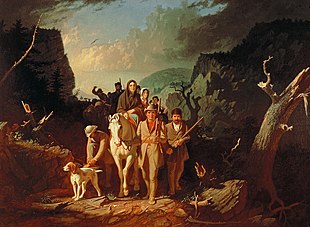
Back Historia de Kentucky Spanish Histoire du Kentucky French ケンタッキー州の歴史 Japanese История Кентукки Russian
This article's lead section may be too long. (December 2023) |

| History of Kentucky |
|---|
|
|
|
The prehistory and history of Kentucky span thousands of years, and have been influenced by the state's diverse geography and central location. Archaeological evidence of human occupation in Kentucky begins approximately 9,500 BCE. A gradual transition began from a hunter-gatherer economy to agriculture c. 1800 BCE. Around 900 CE, the Mississippian culture took root in western and central Kentucky; the Fort Ancient culture appeared in eastern Kentucky. Although they had many similarities, the Fort Ancient culture lacked the Mississippian's distinctive, ceremonial earthen mounds.
The first Europeans to visit Kentucky arrived in the late 17th century via the Ohio River from the northeast, and later, in the late 18th century, from the southeast through natural passes in the Appalachian Mountains. Early Settlers pursuant to the Treaty of Fort Stanwix 1768, came into conflict with the Shawnee, Cherokee and other tribes in their south of Ohio hunting grounds. This launched Lord Dunmore's war in 1774, and during the Revolution, it became the Cherokee-American Wars that lasted until after statehood. A series of county divisions of Virginia Colony west of the Appalachians resulted in Kentucke County in 1777, the District of Kentucky, and finally its admission into the Union as the 15th state on June 1, 1792.
The early economy rested on family farms, with a rapid growth in tobacco for the national market. Until 1865, slavery played a significant role in Kentucky's economy and politics. The state remained a border state during the Civil War, with both Union and Confederate sympathizers, and the issue of slavery ultimately led to the state's split between the North and South. Union forces controlled the state during the war. Slavery was abolished by the 13th Amendment in late 1865. Following the Civil War, Kentucky underwent a period of Reconstruction, during which the state's political and social structures were reshaped to reflect the post-war era. Black people gained the right to vote in Kentucky and never lost the right.
Kentucky has a long and complicated history of feuds, especially in the mountains. They were rooted in political, economic, and social tensions. Violence climaxed with the assassination of Governor William Goebel in 1900. Industrialization rose in the late 19th and early 20th centuries, with the coal mining and manufacturing industries playing a significant role in the state's economy.
In 1919, the 18th Amendment to the U.S. Constitution went into effect, prohibiting the sale and consumption of alcohol. Kentucky, a major producer of bourbon and other distilled spirits, saw significant social and economic changes as a result, with moonshining in the mountains to provide liquor for the cities to the north.
The mid-20th century saw significant civil rights struggles in Kentucky and across the United States, with activists fighting for equal rights for African Americans and other marginalized groups. Throughout the latter half of the 20th century and into the 21st century, environmental issues have become increasingly important in Kentucky. Especially important are concerns over the coal mining industry's impact on the environment and public health leading to political and social changes. The late 20th and early 21st centuries have seen significant economic changes as globalization has become a major force in the American and global economies. Also in the 21st century, Kentucky has seen a significant increase in immigration, leading to demographic changes and debates over immigration policy.
© MMXXIII Rich X Search. We shall prevail. All rights reserved. Rich X Search